|
|
|
Sort Order |
|
|
|
Items / Page
|
|
|
|
|
|
|
| Srl | Item |
| 1 |
ID:
190854
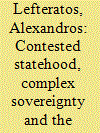

|
|
|
|
|
| Summary/Abstract |
The emergence, longevity and resilience of contested states have redefined the relationship between sovereignty and territoriality. While fully-fledged states uphold the monopoly of authority, contested states seek to rewrite the sovereignty playbook and gain a seat among sovereign equals. This atypical antagonism, propped up by post-Westphalian statehood aspirations, has changed the way sovereignty is perceived and understood nowadays. Approaching sovereignty as multi-faceted, this article discusses contested statehood in the context of the EU's engagement overseas. Drawing on the literature of Europeanisation and complex sovereignty, it accounts for the influence of contested statehood on the EU's role and policies in contested states. Specifically, by delving into Kosovo's complex sovereignty (internal/external), the analysis measures the fluctuating impact of contestedness on the EU's employed policy frameworks and deployed crisis management tools unfolding a paradox that has defined the EU's foreign policy in Kosovo for years.
|
|
|
|
|
|
|
|
|
|
|
|
|
|
|
|
| 2 |
ID:
190852
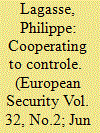

|
|
|
|
|
| Summary/Abstract |
This article examines how the French Senate engaged in legislative oversight of the military between 2015 and 2020. Drawing on semi-structured interviews with French parliamentarians, parliamentary staff, and serving and retired military leaders, the article argues that the French Senate performed “community policing” oversight of the military during this period. This community policing approach, which relies on mutual trust and cooperation between the principal and the agent, allowed senators to oversee the military and check the executive at relatively low cost, while giving military leaders a parliamentary ally in their disagreements with the President and Cabinet. The article examines what conditions enabled and encouraged the French Senate to perform this type of oversight, as well as what civil–military dynamics led the French military to view senators as allies in their policy disagreements with the President. The article finds that the 2015 terrorist attacks on French soil played an important role in establishing closer ties between the upper house and the armed forces, with the Senate securing additional capabilities for the armed forces during this time. The article concludes with avenues for future research focusing on upper houses and legislative oversight of the military.
|
|
|
|
|
|
|
|
|
|
|
|
|
|
|
|
| 3 |
ID:
190851
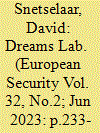

|
|
|
|
|
| Summary/Abstract |
Amid concerns over the rivalry between Washington and Beijing, the discourse and practice of knowledge security have become prevalent in Europe. This is especially true with regard to Sino-Western research collaborations on emerging technologies. Despite the scientific and economic benefits, these collaborations are increasingly perceived as a potential threat in the context of broader concerns with so-called hybrid threats. Knowledge security has emerged as a key term to identify and mitigate the risk of espionage, unwanted knowledge transfers, censorship, and the misuse of dual-use technology. To understand knowledge security and its implications, the article offers a qualitative, in-depth case study of Dreams Lab in the Netherlands: an AI research project run by the University of Amsterdam and the Free University of Amsterdam and funded by the Chinese company Huawei. Li’s practices of assemblage are used as an analytical framework to answer the question: how and why a diverse group of actors were brought together to respond to Dreams Lab and govern scientific knowledge on emerging technologies? By analysing the discourse and practice of knowledge security, the article offers crucial insights into how the great power rivalry is shaping scientific research and the international exchange of knowledge and technology.
|
|
|
|
|
|
|
|
|
|
|
|
|
|
|
|
| 4 |
ID:
190848
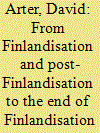

|
|
|
|
|
| Summary/Abstract |
Putin’s full-scale invasion of Ukraine on 24 February 2022 triggered a process that saw Finland abandon its traditional policy of military non-alignment and, together with Sweden, submit an application for NATO membership. Finland’s history of Finlandisation came up routinely in the parliamentary debates on a NATO application and there was a broad consensus that NATO membership would mark the end of Finlandised Finland. Accordingly, this article has a dual aim. First, it seeks to chart the main lines of post-war Finnish foreign and security policy since the late 1960s using Finlandisation and post-Finlandisation as the organising concepts. Second, it explores why, ultimately, Finland applied for NATO membership in May 2022. Putin’s invasion of Ukraine, it is suggested, engendered a psychosis of fear among the Finnish public, stirring collective memories of the loss of land, lives and livelihood at the hands of unprovoked Soviet aggression in the 1939–40 Winter War and the fear of history repeating itself at various tension points in Finno-Soviet relations thereafter. Strikingly, until 24 February a clear majority of politicians and the Finnish public opposed NATO membership.
|
|
|
|
|
|
|
|
|
|
|
|
|
|
|
|
| 5 |
ID:
190855


|
|
|
|
|
| Summary/Abstract |
This study examines the cooperation and coordination mechanisms established by Turkey, the European Union (EU) and the United Nations (UN) to ensure Syrians’ human security in Turkey. Focusing empirically on security governance processes and practices that have been applied to increase the human security of Syrians in Turkey since 2011. To this end, policies on burden sharing, freedom from fear, and freedom from want regarding Syrians in Turkey are presented. To identify the security needs of Syrians in Turkey and develop solutions adjusted to their needs, the UN and the EU cooperate with the public authorities in Turkey on policy-making processes and provide input for the institutionalisation of Turkey’s asylum system. This study argues that in theory, the actors, who set the security agenda, can create joint policies by focusing on human security and that in practice, this has produced policy implications regarding the human security of Syrians in Turkey.
|
|
|
|
|
|
|
|
|
|
|
|
|
|
|
|
| 6 |
ID:
190849
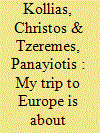

|
|
|
|
|
| Summary/Abstract |
Using President Joe Biden’s opinion article published in The Washington Post ahead of the June 14, 2021 NATO Summit as a point of departure, the present paper examines how NATO members fare in terms of the core constituent elements of liberal democracy such as civil liberties and freedom of expression. To this effect, the paper uses three indices constructed and published by the Varieties of Democracy project. The Liberal democracy, Civil liberties and Freedom of expression indices. The results from club convergence analysis that covers the post-Cold War period, indicate the presence of different convergence clubs among NATO’s member-states and Turkey as the single divergent country. Moreover, given that many NATO countries are also EU members, the paper examines the comparative effect the dual NATO and EU membership had on the democratisation process of East European countries and Turkey. The findings suggest a statistically stronger impact of EU membership vis-à-vis NATO membership.
|
|
|
|
|
|
|
|
|
|
|
|
|
|
|
|
| 7 |
ID:
190850


|
|
|
|
|
| Summary/Abstract |
The article describes the process of norm localisation in the security sector by analysing the context, format and functions of national security strategies published by the Visegrád countries between 1990 and 2020. After the end of the cold war, the “Europeanisation” of the security policy of Central European took place, which included the publication of Western-style national security strategies. Nevertheless, due to national and regional particularities, such documents serve specific political and communication functions, signifying that Visegrád states localised the practice of issuing national security strategies instead of merely copying them. This process led to the diminishing practical value of such documents at the expense of their communication role in terms of belonging and hedging. The article tracks these developments through the three waves of Central European national security strategies between 1990 and 2020 through the analysis of their political context, aims and specific attributes based on various criteria. Results of the research indicate that the functions of national security strategies varied in different stages of the norm localisation process, which questions the traditional method of comparing explicit strategies through content analysis.
|
|
|
|
|
|
|
|
|
|
|
|
|
|
|
|
| 8 |
ID:
190853


|
|
|
|
|
| Summary/Abstract |
The study of why and when governments are caught out by strategic surprise has been a major occupation of intelligence studies, international relations, public administration and crisis management studies. Still little is known, however, about the structural vulnerabilities to such surprises in international organisations such as the European Union (EU). EU institutions themselves have not undertaken rigorous investigations or public inquiries of recent strategic surprises, instead relying on internal review processes. In order to understand the most common underlying problems causing surprise in the EU context, this paper adapts and tests insights from the strategic surprise literature. It elaborates a theoretical framework with five hypotheses about why the leadership of EU institutions has been prone to being caught by surprises in foreign affairs: limitations in collection capacity, institutional fragmentation of policymaking, organisational culture, member state politicisation, and cognitive biases arising from collective ideas and norms. These hypotheses are tested using a post-mortem approach investigating two significant strategic surprises: the start and spread of the Arab uprisings of 2010/11 and Ukraine–Russia crisis of 2013/14.
|
|
|
|
|
|
|
|
|
|
|
|
|
|
|
|
|
|
|
|
|